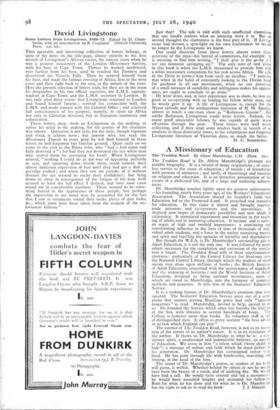David Livingstone
THIS agreeable and interesting collection of letters belongs, in spite of the dates on the title-page, almost entirely to the first stretch of Livingstone's African career, the sixteen years when he was a pioneer missionary of the London Missionary Society, with his base in Cape Town. Thence he worked northward, ever further from his base, until he reached the Zambesi and discovered the Victoria Falls. Then he severed himself from his base, and made the famous crossing of Africa, first to the west coast and then right back to the east, at the mouth of the river. Here the present selection of letters ends, for they are in the main his despatches to his two official superiors, the L.M.S. superin- tendent in Cape Town and the L.M.S. secretary in London. It was only after these events that Livingstone returned to London and found himself famous • severed his connection with the L.M.S. and made contact wills the Colonial Office ; and achieved full consciousness of his purpose, namely, to open up Africa not only to Christian missions, but to European commerce and colonisation.
These letters, then, show us Livingstone in the making, or rather his mind in the making, for the granite of his character was inborn. Quotation is not easy, for the style, though vigorous and vivid, is seldom terse ; but anyone who has read the Missionary Travels in years gone by will find himself in these letters on half-forgotten but familiar ground. Quite early on we come to the visit to the Bakaa tribe, who "had a bad name and fully deserved it " ; for had they not destroyed the last white man who visited them by poisoning his food? When Livingstone arrived, "nothing I could do in the way of appearing perfectly at ease, and squatting down beside them, could remove their almost ludicrous expression of fear until they had got a dish of porridge cooked ; and when they saw me partake of it without distrust the act seemed to excite their confidence ; but lying down to sleep in consequence of the fatigue of the long walk seemed to have the full effect I desired, and they soon came round me in considerable numbers. There seemed to be some- thing horrid in the appearance of these people, but perhaps the impression in my mind may be accounted for by the fact that I saw as ornaments round their necks pieces of gun locks, &c., which must have been taken from the waggon of the un- fortunate Gibson." with Just that! e tale is told wi such unaffected clumsinem
that one hardly realises what an amazing story it is. But on second thoughts the clumsiness is the best part of it. If Living. stone had thrown a spot-light on his own fearlessness he would no longer be the Livingstone we know.
One could illustrate from these letters almost every char. acteristic of the man—his hatred of committees, for example. It
amusing usin " I the go-by to find him writing, shall give it by if I see any nonsense springing up." The only note of real alarm in this book is when the L.M.S. threatened to provide him with a white missionary companion for his trek across Africa. He calls in the Deity to protect him from such an incubus. "I consider that when in the habit of constantly looking to the Divine hand for guidance in all our movements, when no one possessed of a small measure of suitability and willingness makes his appear- ance, we ought to conclude to go alone."
He went alone, and, as later experience was to show, he was not good at co-operating with or leading his fellow white men, and he wisely gave it up. A life of Livingstone is, except for the Nyasa .episode and the unimportant intrusion of H. M. Stanley, almost as much a one-man show as "Robinson Crusoe." But unlike Robinson, Livingstone could write letters. Indeed, like many gruff unsociable fellows, he was capable of quite warm affections through the post. These letters were well worth collecting, and if they send some readers back, in search of an anodyne in these distressful times, to the voluminous and forgotten Livingstone literature of Victorian days, so much the better.
D. C. SOMERVELL.






























 Previous page
Previous page